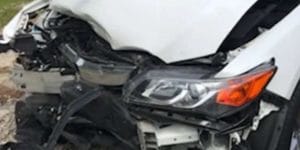How Brooks Injury Law Helps You After a Car Accident
- A car accident is an unexpected event that can have a lasting impact on your life.
- It often leads to significant stress, affecting your physical and emotional well-being.
- The process of dealing with insurance companies, determining fault, and pursuing a fair outcome can be lengthy and overwhelming.
- Returning to normal life after an accident can be a challenge, but you don’t have to go through it alone.
- Brooks Injury Law will handle all communication and negotiations with the insurance companies so you can focus on your recovery and well-being
Verdicts and Settlements Won For Clients
*Average Settlement is $110K
Compensation for Georgia Car Accident Victims
Automobile accidents are never planned or expected, but unfortunately, they still occur far too often. When they do happen, you are left to deal with the aftermath. Brooks Injury Law is here to help you with your recent automobile accident so that you are not left to piece together the puzzle alone.
Whether the accident was caused by distracted driving, speeding, or Georgia roadway hazards we are here to ensure that you get the compensation you need while recovering. Automobile accidents are startling and it can take a while to get back up on your own two feet. Our team will never leave you to fend for yourself when trying to settle an auto crash case.
We strive to get you the largest financial payout possible that can assist you in dealing with severe injuries, long-term medical problems or treatment, lost wages, and other strains that an automobile accident may have caused.
We proudly serve the state of Georgia with a large focus on the cities within and surrounding Gwinnett County.
What To Do After a Car Accident
Move to Safety
If possible, move to the shoulder of the road for your safety and the safety of others.
Call The Police
Always call the police to obtain a police report for your records. Additionally, call for medical assistance if injuries are sustained in the accident.
Gather Information
Gather information from all parties involved, including their names, phone numbers, and insurance information. For your records, also take pictures at the scene of all vehicles involved. Try to locate any witnesses at the scene and get their identifying information as well.
Wait. Don't Admit Fault
Wait for the police to arrive to investigate the accident that has just occurred. They will then determine the party at fault.
Seek. Call An Attorney
Seek legal representation and never pay for a consultation. Find someone that will listen to your case free of cost and determine the best plan of action.
Common Causes of Car Accidents
Distracted Driving
Texting, eating, doing hair or makeup, reaching for things in the back seat, etc. are all contributing factors to car crashes nationally. Any action that requires you take your eyes off the road or hands off the wheel is considered a distraction to your driving. Using your phone to text or place calls is now illegal in the state of Georgia thanks to the Hands-Free Act. This law was designed to decrease the statistics surrounded by distracted driving and car accidents. For more on the Georgia Hands-Free act, visit headsupgeorgia.com
Speeding
Exceeding the speed limit is yet another common cause of car accidents on our Georgia roadways. There was a 25% increase in speed related deaths in 2016 as compared to 2014 throughout the state of Georgia.
Roadway Hazards
Many roadway hazards can be created from construction zones, uneven lanes, potholes, and other debris. All of these factors can easily cause a car accident, especially if you are not prepared to encounter such hazards.
Drunk Driving
Drunk or impaired driving is one of the leading causes of roadway accidents not only in Georgia, but all across the nation. In 2016, impaired drivers were responsible for nearly 400 car crash fatalities, according to the Georgia Governor's Office of Highway Safety.
Drowsy Driving
Drowsy Driving is found most common between the hours of 9 PM and 6 AM according to the National Highway Traffic Safety Administration. The NHTSA did reveal, however, that drowsy driving decreased by 3.5% in 2016 compared to the previous year.
Fighting for Georgians
At Brooks Injury Law, we fight for our clients that have been victims of car accidents. We will take the hassle of dealing with insurance companies off of your hands so you can focus on getting the medical treatment you need to get better. Then, we get you the settlement you need and deserve.
We do everything we can to get you a result that covers your medical bills, lost wages, pain and suffering, and provides you with overall peace of mind after your accident.
Why Choose Brooks Injury Law?
$66M+
More than $65 Million recovered for Brooks Injury Law clients.
$7M+
More than $7 Million paid out to attorneys who have referred cases to Brooks Injury Law.
$115K+
Average case settlement exceeds $115,000.
1200+
Number of cases handled by Brooks Injury Law, and counting...
4.9
Average Google review rating.








